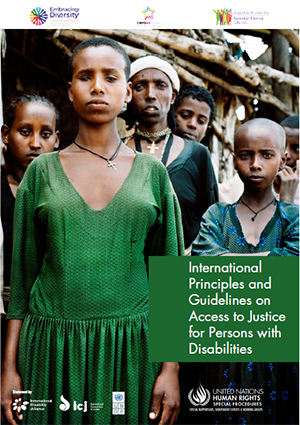International Principles and Guidelines on Access to Justice for Persons with Disabilities
Special Rapporteur on the rights of persons with disabilities
The International Principles and Guidelines on Access to Justice for Persons with Disabilities (PDF) are a practical tool to support States in designing and implementing justice systems that provide equal access to justice for persons with disabilities, in line with international human rights standards.
They are a result of consultations and collaboration with disability rights experts, organizations of people with disabilities, States, academics, and other practitioners, as outlined below.

International Principles and Guidelines on Access to Justice for Persons with Disabilities
PDF: العربية | 中文 | English | Français | Русский | Español
German
Word: 中文 | English | Français | Русский | Español
Easy-Read (PDF): English | Français | Español
Good practices to ensure effective access to justice for persons with disabilities
| CLOSED: | 15 August 2019 |
| Issued by: | Special Rapporteur on the rights of persons with disabilities |
| Purpose: | International Principles and Guidelines on Access to Justice for Persons with Disabilities | Easy-Read version |
Background
Since the adoption of the Convention on the Rights of Persons with Disabilities (CRPD) in 2006, States have committed to remove the barriers that hinder access to justice to persons for persons with disabilities. The Sustainable Development Goals, in particular Goal 16, have reinforced this commitment. Moving forward and supporting States in the implementation of their obligations in this area, has been a priority in the agenda of the Special Rapporteur.
Expert consultations
On 8-9 November 2018, the Special Rapporteur hosted, in collaboration with OHCHR, an Expert Group Meeting with the purpose to discuss the implementation of the rights to legal capacity and access to justice in the context of the administration of justice.
During this meeting, experts from UN entities, regional mechanisms, national justice systems, judicial academies, training centers, civil society and academia stressed the need for the systematization of good practices on access to justice of persons with disabilities and the adoption of guidelines and protocols for those working in the administration of justice.
Following this meeting, in 2019 the Special Rapporteur commissioned a study aiming to identify relevant principles, interventions and strategies to ensure effective access to justice of persons with disabilities on an equal basis with others. The study maps legislation, policy and practice developed or implemented at national, regional and international level to improve access to justice of people with disabilities. It provides a systematization of all the different elements that would make a system CRPD-compliant and disability-inclusive. Based on the findings of the report, draft international principles and guidelines on access to justice for persons with disabilities were drafted.
On 21 February 2020, the Special Rapporteur convened another Expert Group Meeting in Geneva with the purpose to discuss and validate the International Principles and Guidelines on Access to Justice for Persons with Disabilities, with a variety of experts. The document aims to guide States and other actors in the implementation of their international obligations in this field.
Inputs received
Download the questionnaire: English | French | Spanish
All inputs received in accessible formats are available below. Non-accessible formats are available upon request at sr.disability@ohchr.org.
States
- Argentina
- Azerbaijan (non-accessible format available upon request)
- Bahrain
- Brazil
- Bulgaria
- Chile
- China
- Ecuador
- El Salvador
- Georgia
- Germany
- Guatemala
- Honduras
- Italy
- Kuwait
- Lebanon
- Malta
- Mauritania
- Mauritius (Annex I)
- Nigeria
- Qatar (non-accessible format available upon request)
- Russia Federation (non-accessible format available upon request)
- Slovenia
- Spain
- Switzerland
- Ukraine
- Uruguay 1-2
National Human Rights Institutions
- Argentina - Defensor del Pueblo de la Nación
- Azerbaijan - Office of the Commissioner for the Human Rights (Ombudsman)
- Bosnia and Herzegovina- Human Rights Ombudsperson (non-accessible format available upon request)
- Danish Institute for Human Rights
- Ecuador - Defensoría del Pueblo
- Georgia - Office of Public Defender
- India- National Human Rights Commission (non-accessible format available upon request)
- Maldives Human Rights Commission
- Mexico - Comision de Derechos Humanos de la Ciudad de Mexico
- Mexico - Comision de Derechos Humanos
- Netherlands Institute for Human Rights
- Serbia - Protector of Citizens
- Ukrainian Ombudsman
Civil Society, including Organizations of Persons with Disabilities
- Access to Justice Knowledge Hub
- British Deaf Association
- Centro de Sordos del Paraguay (non-accessible format available upon request)
- Confederacíon Estatal de Personas Sordas (CNSE)
- Comite Español de Representantes de Personas con Discapacidad (CERMI)
- Deutscher Gehörlosen-Bund e. V. (DGB)
- Disabled Women Africa
- Documenta
- Federation of Disability Organizations in Malawi
- Hungarian Association of the Deaf and Hearing Impaired
- Intermediaries for Justice
- Latvian Federation of Deaf
- Mental Health Europe
- Modern Education for Kurdistan
- National Union of Women with Disabilities in Uganda
- Samarthanam Trust for the Disabled
- Sinosz
- The Lira District Disabled Women Association in Uganda (LIDDWA) (non-accessible format available upon request)
- Unia
- Visual Hearing Impairment Membership
- Women Enabled International
- World Federation of the Deaf (non-accessible format available upon request)
Academics and Individuals
- Professor Penny Cooper, Birbeck University of London (non-accessible format available upon request)